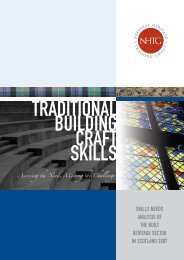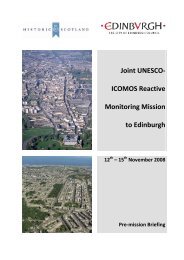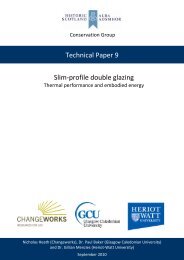NTS Report 4 Aug 2010 - National Trust for Scotland
NTS Report 4 Aug 2010 - National Trust for Scotland
NTS Report 4 Aug 2010 - National Trust for Scotland
You also want an ePaper? Increase the reach of your titles
YUMPU automatically turns print PDFs into web optimized ePapers that Google loves.
21<br />
Future Financial Health<br />
Expenditure on staff salaries and wages is subsumed across the<br />
various items of expenditure shown in the chart and amounts, at<br />
£16.9 million in <strong>2010</strong>, to around 43% of the total outgoing<br />
resources of the <strong>Trust</strong>. Savings of around £3.2 million annually<br />
were achieved by the redundancy programme, but current<br />
negotiations on staff remuneration may again tip <strong>NTS</strong> towards<br />
an operational deficit.<br />
As can be seen from the chart at the bottom of the column on the<br />
opposite page, the day-to-day running costs of the administration<br />
of the <strong>Trust</strong> and its membership and recruitment are small in<br />
relation to the balance of its outgoing resources.<br />
A Breathing Space<br />
The Review is clear that the action taken by the Board in 2009<br />
resulting in emergency economies was necessary. In addition to<br />
these savings, significant economies in procurement and other<br />
areas have also been achieved in recent years.<br />
Concentrating on only essential repairs and maintenance has also<br />
reduced expenditure – spending on conservation dropped 8.1%<br />
in 2009-10 compared to the previous year, though this indicates<br />
a bigger bill in future when delayed work is tackled.<br />
In 2009-10 the General Income Fund has more than doubled,<br />
from £4.1 million the previous year to £8.5 million. Membership<br />
is slightly up, as are visitor numbers (though the underlying<br />
trend from visits is down, with the increase attributed to the<br />
opening of Culloden Visitor Centre and the <strong>Trust</strong> taking<br />
ownership of the Burns <strong>National</strong> Heritage Park).<br />
The <strong>Trust</strong> has also eaten into its remaining reserves from various<br />
restricted funds. These are not replaceable and the charity’s<br />
dependence upon GIF will increase as they decline. In these<br />
circumstances, <strong>NTS</strong> is currently dependent to a large extent on<br />
‘windfalls’ – using legacies, which cannot be predicted with any<br />
certainty, as ready income. The problem of sustainability<br />
there<strong>for</strong>e remains.<br />
As the Chief Executive has noted, there continues to be an<br />
underlying imbalance “between the cost of running the <strong>Trust</strong> and<br />
conserving its properties” and its “regular, predictable income”.<br />
Financial Health<br />
Ten years ago, the <strong>NTS</strong> Council – recognising the stresses under<br />
which the charity operated – adopted a number of Financial<br />
Principles. They caution against GIF being used as “a measure<br />
of the <strong>NTS</strong>’s financial strength” and recognise that whilst the<br />
level of the fund is critical, the quantum of the Endowment and<br />
Restricted funds is also important <strong>for</strong> long term sustainability.<br />
The Principles, in our view, remain valid as a means of<br />
in<strong>for</strong>ming financial decision-making, but should be seen in<br />
balance with the <strong>Trust</strong>’s other Principles.<br />
While <strong>NTS</strong> secured a surplus in 2009-10, there was a deficit of<br />
£959,000 over the previous three years. In submissions to the<br />
Review in May <strong>2010</strong>, the Board and Leadership Team<br />
committed to a ‘surplus budget’ in all future years.<br />
That may not be possible given negotiations in July <strong>2010</strong> with<br />
the staff trade union on remuneration and related matters (which<br />
the Review believes need to be addressed) and the costs arising<br />
from other Review recommendations.<br />
Budget Planning<br />
Each year the Finance Director prepares a high level budget <strong>for</strong><br />
the Board based on the in<strong>for</strong>mation she has from the Leadership<br />
Team’s best estimate of spending on property and likely<br />
potential income. The current budget is prepared on a ‘needs<br />
must’ basis and is not in<strong>for</strong>med by a business plan within the<br />
framework of an overall financial strategic plan.<br />
The expenditure on the <strong>Trust</strong>’s estate appears to be based on<br />
what is deemed absolutely essential <strong>for</strong> immediate repairs and to<br />
keep properties watertight, rather than maintaining the building<br />
to a good conservation standard. Consequently, properties<br />
without adequate endowment or finance from restricted funds<br />
are likely to make larger demands <strong>for</strong> assistance in future.<br />
As noted elsewhere in this report, the Review has been unable to<br />
obtain any reliable in<strong>for</strong>mation on what the financial<br />
commitment the <strong>NTS</strong> has to its properties will be over the next<br />
five years. This, in our view, is a major weakness which must<br />
be addressed through the robust audit of its assets.<br />
While the expenditure side of the budget is in<strong>for</strong>med on a ‘needs<br />
must basis, the income side appears to be based on what is hoped<br />
<strong>for</strong>, given previous years’ expenditure.<br />
On page 32 of this report, we recommend that <strong>Trust</strong>ees should<br />
publish a five-year strategic plan and ensure that <strong>NTS</strong> develops<br />
and integrated system of corporate and financial planning.<br />
Financial Systems<br />
In 2006, the <strong>Trust</strong> identified that a new financial system was<br />
required. The Proactis purchasing system had been poorly<br />
implemented, causing considerable frustration and stress. While<br />
this situation has improved following work by the Finance team,<br />
it is still insufficient <strong>for</strong> timely reporting and analysis.<br />
The core Sun Microsoft system has been in use since 1995 but<br />
no updates have been accepted and it is now out of date.<br />
All reports have to be originated by the central Finance team,<br />
leading to delays in their being made available to end users.<br />
Currently much of the financial in<strong>for</strong>mation needed to run the<br />
<strong>Trust</strong> has to be prepared using spreadsheets and manual<br />
interventions.<br />
Attempts have been made since 2007 to implement streamlined<br />
systems, but progress has been slow. With improved systems,<br />
the <strong>Trust</strong> would have greater access to in<strong>for</strong>mation and an<br />
improved ability to maximise efficiency and monitor<br />
per<strong>for</strong>mance.<br />
P7: The Review proposes that a working group, including<br />
external professionals, be established to report on the future<br />
needs of the <strong>Trust</strong> in its financial systems.<br />
As part of its remit, the group should consider carbon accounting<br />
as a future component of new financial systems.<br />
P8: The Review proposes that the Transition Committee should<br />
at an early date meet representatives of the Steering Group to<br />
consider ways of funding 8the various re<strong>for</strong>m proposals outlined<br />
in this report.<br />
While there will be cost efficiencies in governance and other<br />
areas, the Group is conscious that a number of its proposals will<br />
require additional funding. It is particularly clear that the audit<br />
of properties should be adequately resourced in order that a<br />
report may be presented to the 2011 AGM.<br />
The Group will discuss ways in which this proposal may be<br />
secured with the Transition Committee.



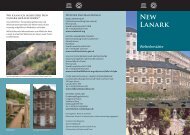
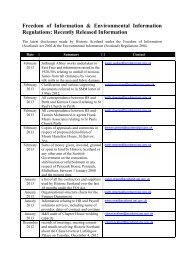
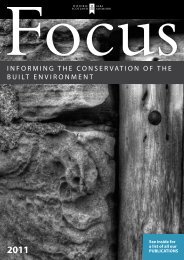
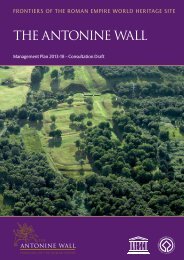
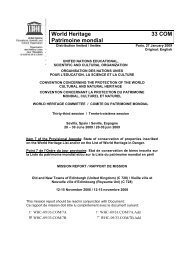

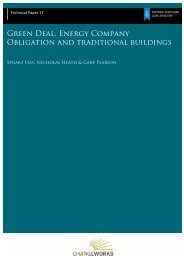

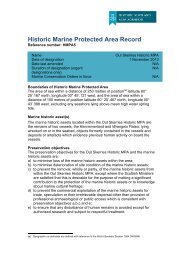
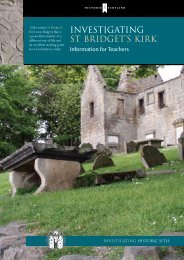
![Elgin Cathedral Wedding Brochure [pdf, 544kb] - Historic Scotland](https://img.yumpu.com/22301571/1/190x151/elgin-cathedral-wedding-brochure-pdf-544kb-historic-scotland.jpg?quality=85)

